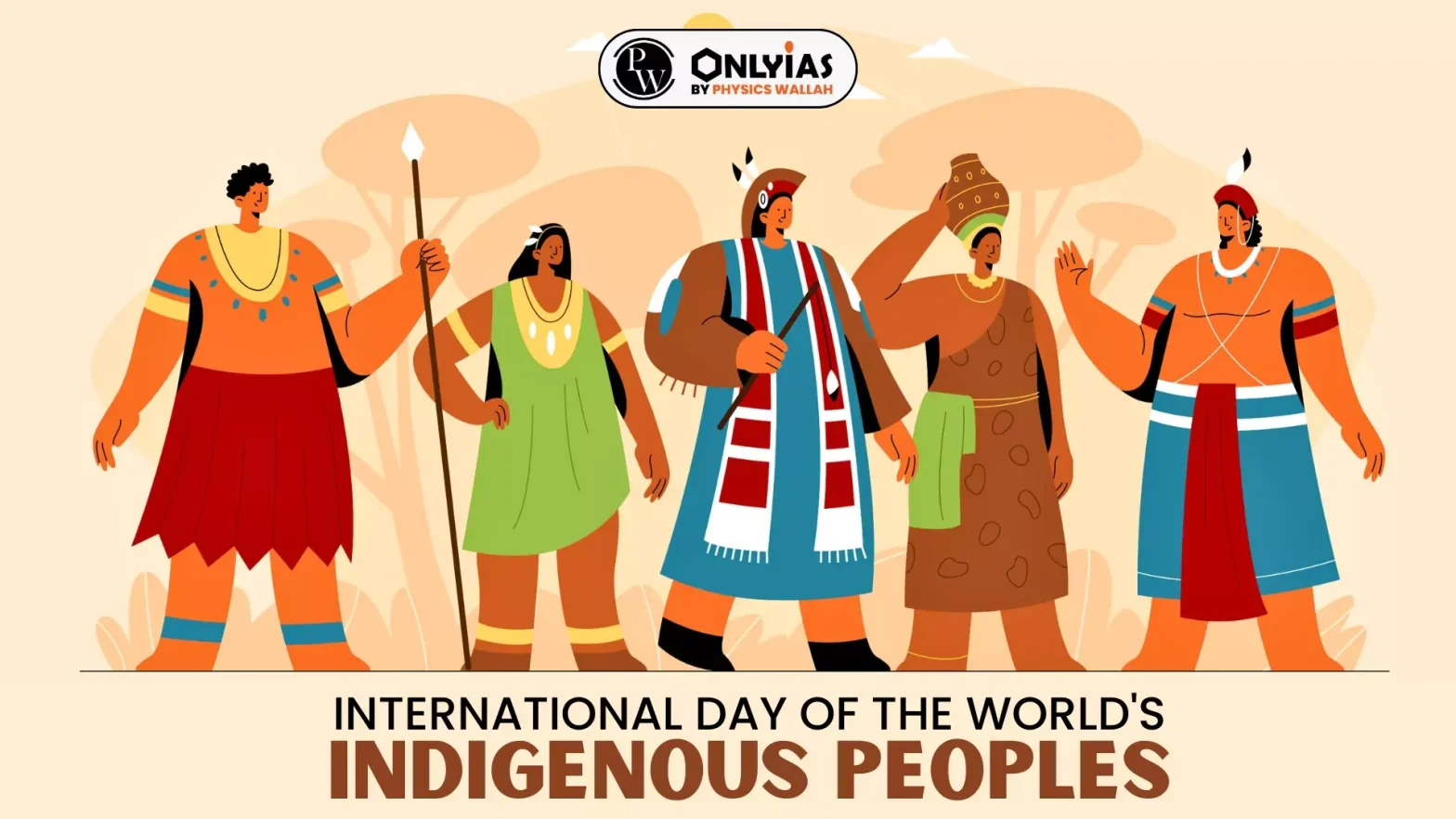International Day of the World's Indigenous Peoples is celebrated on August 9th, every year, to promote and protect the rights of indigenous peoples. Learn more about International Day of the World's Indigenous Peoples.

The International Day of the World’s Indigenous Peoples is observed every year on August 9th to recognize and celebrate the unique cultures, contributions, and challenges of indigenous peoples around the globe. The day serves as a reminder of the need to protect the rights of indigenous populations and to promote their social, economic, and political inclusion. Candidates preparing for UPSC must know about the World’s Indigenous Peoples.
Activist C R Bijoy says, “The knowledge of the world’s indigenous peoples, their ethos, and their way of life is not just for themselves. It is crucial for Non-indigenous people to learn, adapt, and absorb all about the indigenous people to create a more sustainable and egalitarian world,” on the occasion of the International Day of the World’s Indigenous Peoples.
Overview of International Day of the World’s Indigenous Peoples
The International Day of the World’s Indigenous Peoples is observed annually on August 9th. This day is dedicated to recognizing and celebrating the unique cultures, traditions, and contributions of indigenous peoples worldwide. It also highlights the various challenges they face and underscores the importance of protecting their rights.
Origins and Purpose
The United Nations General Assembly declared August 9th as the International Day of the World’s Indigenous Peoples in December 1994. This date commemorates the inaugural meeting of the UN Working Group on Indigenous Populations in 1982. The primary purpose of this day is to promote and protect the rights of indigenous peoples, raise awareness about their distinct cultures and issues, and foster international cooperation to address their concerns.
| International Day of the World’s Indigenous Peoples | |
| Aspect | Details |
| Observance Date | August 9th |
| 2024 Theme | ‘Protecting the Rights of Indigenous Peoples in Voluntary Isolation and Initial Contact.’ |
| Global Indigenous Population | Approximately 476 million |
| Number of Cultures | More than 5,000 |
| Regions | Americas, Africa, Asia, Europe, Oceania |
| UNESCO’s Key Initiatives | Language Preservation, Education, Cultural Heritage, Policy Advocacy |
| Common Challenges | Marginalization, loss of land and resources, threats to cultural identities |
| UNESCO’s Focus | Empowering Indigenous youth, promoting linguistic diversity, safeguarding cultural heritage, advocating for policies |
Aspirants preparing for UPSC Mains 2024 must look for the theme of the Indigenous Day in 2024. The theme for the 2024 International Day of the World’s Indigenous Peoples is “Protecting the Rights of Indigenous Peoples in Voluntary Isolation and Initial Contact.” It highlights the vital role that Indigenous youth play in leading movements for self-determination, preserving cultural heritage, and driving social change within their communities and beyond.
Additionally, it emphasizes the importance of empowering young indigenous leaders to take an active role in shaping their futures and the futures of their people. This theme underscores the need for active engagement and support for Indigenous youth, recognizing their potential to drive positive change and ensure the continuity of their cultural traditions and rights.
Indigenous Peoples around the world are diverse and live in various regions across the world, including the Americas, Africa, Asia, Europe, and Oceania. They are often characterized by their distinct languages, cultural practices, and traditional knowledge systems. Despite their diversity, many indigenous communities face similar challenges, such as marginalization, loss of land and resources, and threats to their cultural identities.
There are approximately 476 million indigenous people globally, spread across 90 countries. They make up about 6% of the world’s population and represent more than 5,000 different cultures. Indigenous Peoples around the world often maintain unique cultural traditions and have a deep connection to their ancestral lands and natural resources, which they have managed sustainably for generations.
The United Nations Educational, Scientific and Cultural Organization (UNESCO) plays a crucial role in supporting and advocating for the rights of indigenous peoples. UNESCO works to preserve indigenous languages, promote education and literacy, and safeguard cultural heritage. Some of the key initiatives include:
The International Day of the World’s Indigenous Peoples 2024 provides an opportunity to celebrate the resilience and contributions of Indigenous youth while addressing the challenges they face. By highlighting their role as agents of change, the theme underscores the importance of supporting and empowering the next generation of Indigenous leaders.
Enroll in our UPSC PW Online Coaching to get expert and the best resources to prepare for UPSC Examination.
The International Day of the World's Indigenous Peoples is observed on August 9th to recognize the achievements and contributions of indigenous peoples and to promote their rights.
The theme for 2024 is 'Protecting the Rights of Indigenous Peoples in Voluntary Isolation and Initial Contact.'
There are approximately 476 million indigenous people worldwide, representing more than 5,000 cultures across 90 countries.
Indigenous peoples often face challenges such as marginalization, loss of land and resources, and threats to their cultural identities.
UNESCO supports indigenous peoples through initiatives aimed at language preservation, education, cultural heritage protection, and policy advocacy.
<div class="new-fform">
</div>